The turning point that has been outlined this year in relation to Russia by foreign partners demonstrates that a policy aimed at isolating our country is proving to be ineffective. The tendencies toward building a post-Western world and forming of a polycentric international system are more visible at the level of civil society. The Western public urges their governments to abandon ideological approach and choose a pragmatic way in cooperation with Russia. The Civic Chamber is actively establishing international relations and cooperation, building a systemic basis for restoring credibility between people, creating a positive environment for the development of interstate relations and supporting Russian citizens and compatriots abroad.
PUBLIC DIPLOMACY
In commemoration of the 70th anniversary of the establishment of diplomatic relations between Russia and China, a delegation of the Civic Chamber of the Russian Federation paid a visit to Beijing and Shanghai at the invitation of the China Economic and Social Council (CESC).
The delegation of the Chamber was met at high level, in particular, took place meetings with a member of the Politburo Standing Committee, Chairman of the Chinese People's Political Consultative Conference (CPPCC) Wang Yang, and Chairman of the CESC, Du Qinglin. During the visit, an updated Protocol on cooperation between the Civic Chamber of the Russian Federation and the CESC of the PRC was signed. In particular, this updated Protocol involves regular consultations and exchange of views on a wide range of issues, organization of seminars, conferences, round tables and working exchanges.
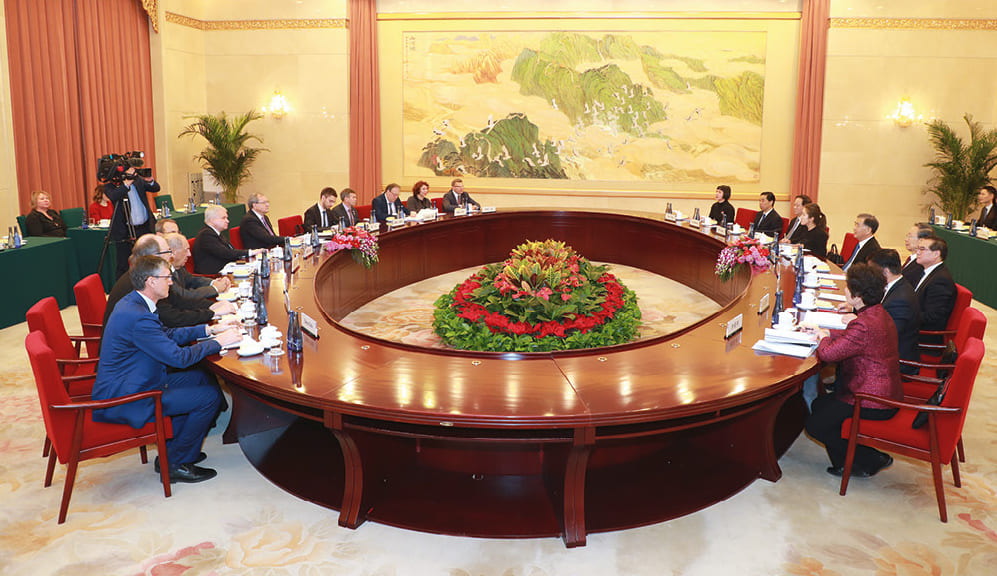
Well-established ties with Chinese public organizations provide an opportunity to interact in a variety of areas. Over the 2019 year, four delegations of the CPPCC visited the Civic Chamber of the Russian Federation. During the discussions, the parties agreed to expand cooperation within the framework of pairing the Eurasian Economic Union and the Chinese initiative “One Belt One Road”. In addition to socio-economic matters, including the development of tourism, members of the Chamber discussed global security issues with Chinese partners.
Deputy Secretary of the Civic Chamber of the Russian Federation, Ambassador Extraordinary and Plenipotentiary Sergey Ordzhonikidze, took part in the second conference on global security "Wanshou", which was organized by the Chinese People’s Association for Peace and Disarmament with the support and participation of the International Department of the Communist Party of China Central Committee. Together with other high-level experts from 20 countries, Sergey Ordzhonikidze took part in the discussion on global and regional security issues and relations between the main players of the world politics.
The Economic, Social and Environmental Council (ESEC) of France, the oldest of these institutions in the world, has been searching for new democratic instruments in the conditions of people's disappointment in state institutions and their desire to take a greater part in decision-making, namely, solving the problem of “yellow vests movement”. For the first time during the existence of the Civic Chamber of the Russian Federation this year was marked by an exchange of visits with the ESEC of France, during which a Memorandum of Cooperation and Interaction was signed. The parties exchanged views on the working methods of the Civic Chamber of the Russian Federation and the ESEC of France in terms of mediating social protests, creating tools and mechanisms for communicating the demands of society to governing bodies and authorities.
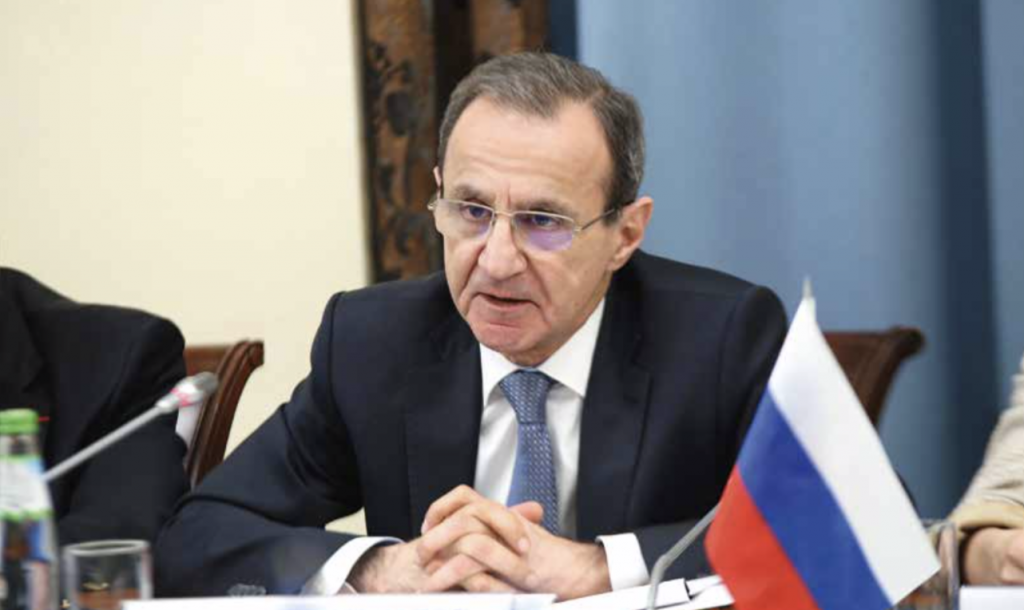
Another memorandum of cooperation and mutual understanding was signed in Aachen during the participation of the delegation of the Civic Chamber of the Russian Federation in the XV Russian-German Twinned cities Conference “Ways of mutual understanding: partnerships as a link in the German-Russian dialog” i.e. the Memorandum between the Civic Chamber of the Russian Federation and the German-Russian Forum. The conclusion of the Memorandum was an embellishing expression of the desire of German society to cooperate with Russia, as opposed to the current standoff at the official level.
Representatives of parliamentary structures of Italian regions supported their German colleagues, who at a meeting in the Civic Chamber said that they in their country stood for eliminating sanctions against Russia and restoring relations with Russia, and against Europe's Russophobe policies.
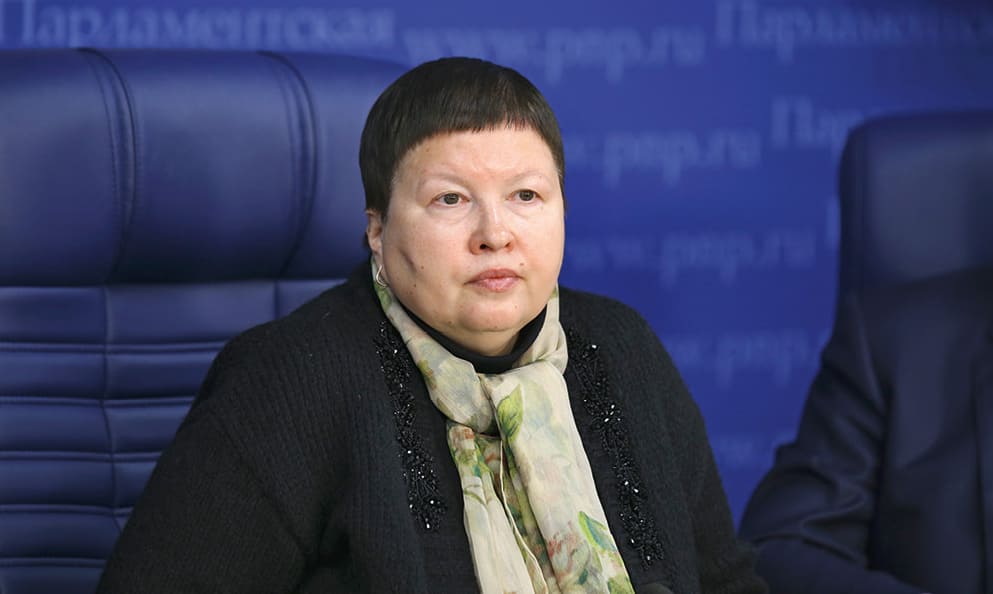
Traditionally important for the Civic Chamber as a member of the AICESIS (The International Association of Economic and Social Councils and Similar Institutions) is the exchange of views on strengthening trilateral dialog, which helps to create a climate of trust, increase production and labor productivity and, as a result, faster economic development. This year, the delegation of the Civic Chamber, along with representatives of economic and social councils from 13 Asian countries, took part in the Asia Social Dialog Forum, organized by the Economic, Social and Labor Council of South Korea with the support of the International Labor Organization and AICESIS. The key topic of the international agenda of the Civic Chamber was the prospects for the transformation of the global civil society in the context of digitalization. Standing for the development of public dialog in Asia, members of the delegation proposed expanding in the traditional tripartite dialog by including large-scale international corporations of a new type, forming digital platforms for business and changing the foundations of economic development for the whole world.
In the Eurasian space, Russia is promoting a project of economic integration. During the visit of the delegation of the Chamber to Nur-Sultan (Republic of Kazakhstan), a Memorandum of Cooperation and Mutual Understanding was signed between the Civic Chamber of the Russian Federation and the Civil Alliance of Kazakhstan, which unites more than a thousand NPOs of the country and plays the role of an ideological center for combining the interests of the state and the civil sector in Kazakhstan. The parties agreed to increase cooperation at the level of civil society institutions, which, in turn, would help strengthen the trend towards Eurasian cooperation.
This idea was also supported at the meeting of the Deputy Secretary of the Civic Chamber S.A. Ordzhonikidze with the President of the Republic of Kazakhstan K.-J. K. Tokaev.
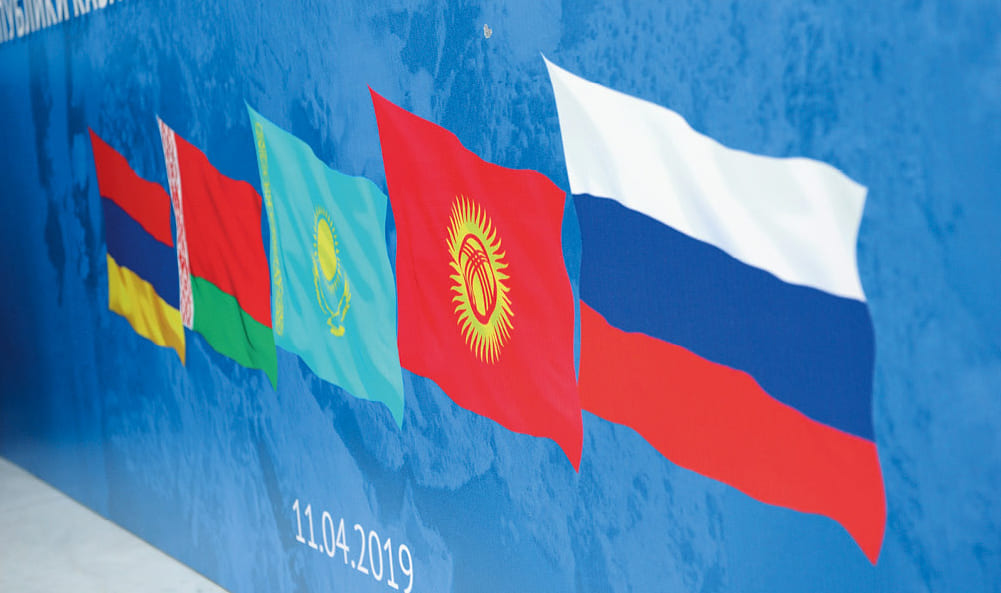
In the light of the announcement by the President of the Russian Federation of 2020 as a cross year with the Kyrgyz Republic and in order to further develop cooperation between representatives of non-governmental organizations the Civic Chamber held the international forum “Kyrgyz Diaspora: Interregional public organization “Kyrgyz Unity” – yesterday, today, tomorrow”175, the participants of the forum assessed the role of diasporal public associations in strengthening bilateral relations.
As part of the development of public diplomacy, the participation of members of the Civic Chamber in work at large international venues with the goal of upholding the positions of Russia is important. At a meeting with representatives of Russian regional non-profit organizations176, Russian Foreign Minister S.V. Lavrov stated that the interest of the Russian Foreign Ministry to strengthen the position of Russian NPOs in the UN and to provide comprehensive support to the Russian NPOs in obtaining status under the UN Economic and Social Council.
Speaking at the 41st session of the UN Human Rights Council, member of the Civic Chamber of the Russian Federation, head of the regional Bulgarian national and cultural autonomy of the Republic of Crimea Ivan Abazher called on the UN General Assembly to consider at a regular session the issue of the blockade of Crimea by Ukraine and give it a principled international assessment. In addition, he said that the Ukrainian state continued to persecute Crimeans for political reasons, as well as restricting their freedom of movement, which led to the impossibility of family reunification and visits of relatives in Ukraine, as people were prosecuted in terms of criminal law if their political views did not coincide with official policies of the Kiev regime.
The acute problems of information wars were raised during the round table on the topic “Hype as a means of forming public opinion and mobilizing mass consciousness”, organized by the Civic Chamber on the sidelines of the Human Dimension Implementation Meeting of OSCE.
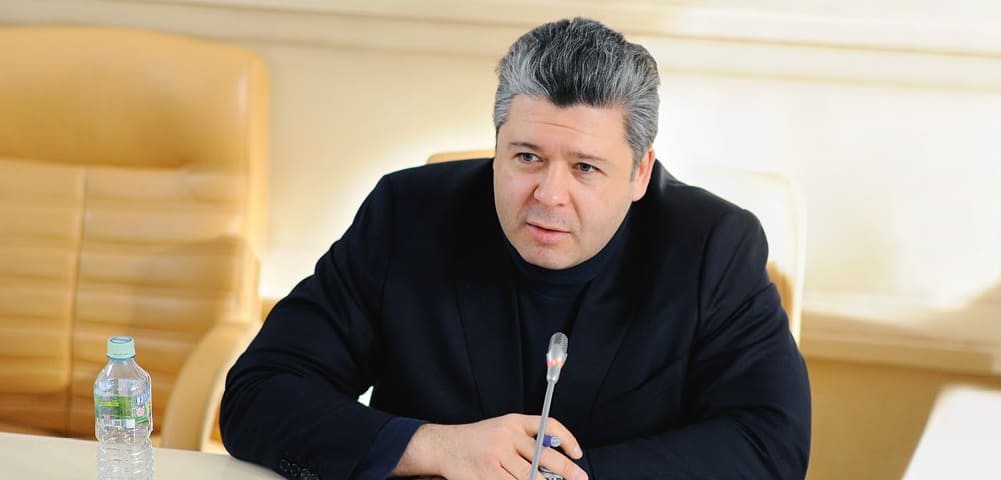
The “Independent Evaluation and Dissemination of Information on the Activities of the 'White Helmets' Organization — Accomplices of Terrorists and Sources of Misinformation Using the Potential of Russian Public Diplomacy” project, introduced with the support of the Civic Chamber, provoked a high-profile public response in the international arena. As part of the project, more than 100 interviews were conducted with former members of the organization and the affected residents of Syria, which was consequently resulted in a book in Russian and English. The materials obtained as a result of the study were presented in 2019 at large international venues: at the UN headquarters in New York, at the Organization for the Prohibition of Chemical Weapons in The Hague, on the sidelines of the 40th session of the UN Human Rights Council in Geneva, as part of the annual OSCE Anti-Terrorism Conference in Bratislava, as well as as part of special events for diplomats and experts held in Berlin, Madrid, Paris, Singapore, Delhi and Jakarta.
SUPPORT AND PROTECTION OF COMPATRIOTS ABROAD
Issues of supporting compatriots traditionally fall within the scope of activities of members of the Civic Chamber of the Russian Federation. The Russians remain one of the largest divided peoples in the world. From 26 to 30 million of our compatriots live abroad. Participating in the forums of compatriots in various countries, members of the Chamber emphasize the need to increase activity in cooperation with compatriots abroad in order to promote the Russian language and form a pro-Russian cultural and political lobby. Along with it, and according to members of the Chamber, special attention should be paid to the republics of the former USSR, where, unfortunately, many of our compatriots are infringed on their rights and are subjected to discrimination in a various forms.
In a number of countries, there is a rewriting of history that takes place to please nationalists and pro-Western political forces; the use of the Russian language is limiting, not only in the field of education, but even in everyday communication.
In particular, the Civic Chamber of the Russian Federation issued an official statement in connection with the entry into force of the law on the state language in Ukraine. The statement condemns open-faced discriminatory law against millions of its citizens based on the language and calls on the Ukrainian authorities to comply with the Constitution of their country and to fulfill their international obligations.
Over the past two years, the Civic Chamber of the Russian Federation has been collecting materials and organizing the protection of our citizens, i.e. the colonel of the Soviet Army reserve, Kaliningrad resident Yuri Mel and his colleague Gennady Ivanov living in Vilnius, who were under unlawful criminal prosecution in March 2019 convicted in the case of the events of January 13, 1991 in Vilnius. The Civic Chamber is carefully studying the progress of the situation in order to carry out measures to mobilize society in terms of supporting illegally convicted citizens of Russia and their immediate releasing from custody. Moreover, there is and active work at place to further develop, together with interested ministries and departments, public organizations and the expert community, a system of measures to protect compatriots subject to criminal prosecution abroad, and to prepare specific proposals to the relevant authorities with the authority to implement these proposals.177
Another priority of the Civic Chamber is to promote the study of the Russian language in the world, which is a key tool for developing international cooperation and creating a positive image of Russia abroad.
Every year, the geography of the Civic Chamber's project called "Russky Ugolok" is growing and the International Public Fund “Russian Peace Fund”. For example, multimedia textbooks on the study of the Russian language were sent to the Russian language school and the children's art studio in "MIR", which is located in Reykjavik, the capital of Iceland.178 The Civic Chamber also advocates an increase in quotas for the education of foreign students in Russia, in particular from Laos and Cameroon.
In order to intensify the expert and public dialog on international relations in 2019, the composition and the structure of the Russian Civic Council for International Cooperation and Public Diplomacy, established in 2012, were updated.
Over the past year, the Council held a number of round tables on such topics as “Russia and Belarus: experience of a common history and a look into the future”, "Relations between Russia and Germany: historical lessons”, “The role of the public in promoting integration processes in the Eurasian space”, “Russia – NATO relations: modern trends of development”, the Russian-German-French trialogue “Architecture of Collective Security in Europe: comprehension of new realities ”, which had as main speakers, in particular, Deputy Ministers for Foreign Affairs of the Russian Federation A.V. Grushko, A.A. Pankin, as well as State Secretary of the Union State of Russia and Belarus G.A. Rapota. The discussions received a serious response, and the Chamber’s proposals on improving the climate of international cooperation through the engagement of representatives of civil society were sent to the relevant departments.
COORDINATION COUNCIL ON COUNTER TERRORISM
Another important expert council of the Civic Chamber is the Coordination Council on Counter Terrorism, created in 2015, headed by Deputy Secretary of the Civic Chamber of the Russian Federation S.A. Ordzhonikidze. The Council includes a number of working groups from prominent Russian religious scholars, representatives of various religious faiths and public figures. The Council works to prevent threats to national identity, state and personal sovereignty, security and sustainable development of the Russian Federation, and is engaged in the prevention of terrorism and extremism. This led to creation of a group of young specialists, who conduct work with social networks, talking about the destructiveness of pseudo-religious ideology and posting anti-extremist content.
The website of the Civic Chamber receives reports on all cases of ideological recruitment.
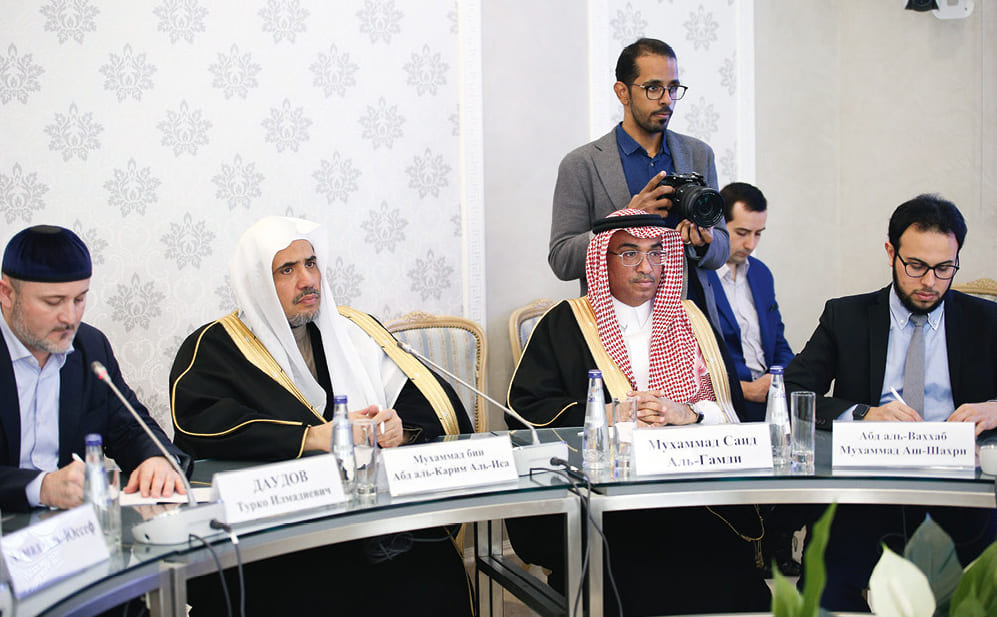
With the support of the Coordinating Council for Countering Terrorism, the International Scientific and Practical Conference “Ways to achieve an interfaith peace: the role of prominent theologians, diplomats, and public figures” was held. Experts and religious figures from 38 countries expressed mutual opinion on the need to consolidate efforts to harmonize interreligious relations, intercultural relations and an effective ideological counteraction to modern threats and challenges.
As part of the strengthening interaction and coordination of efforts with representatives of the clergy all over the world, in particular, educational programs are being implemented jointly with religious organizations of Central Asia to prevent interethnic and interreligious conflicts and to train highly qualified specialists among religious figures.
In cooperation with regional civic chambers, scientific and practical interregional conferences were held in Tomsk, Irkutsk, Volgograd, Krasnoyarsk, Kemerovo, Surgut, Cheboksary and other constituent entities of the Russian Federation. Events are parallelled by meetings with the heads of the regions in order to discuss issues related to the implementation of the Counter-Extremism Strategy in the Russian Federation and the Concept of State Migration Policy of the Russian Federation until 2025.
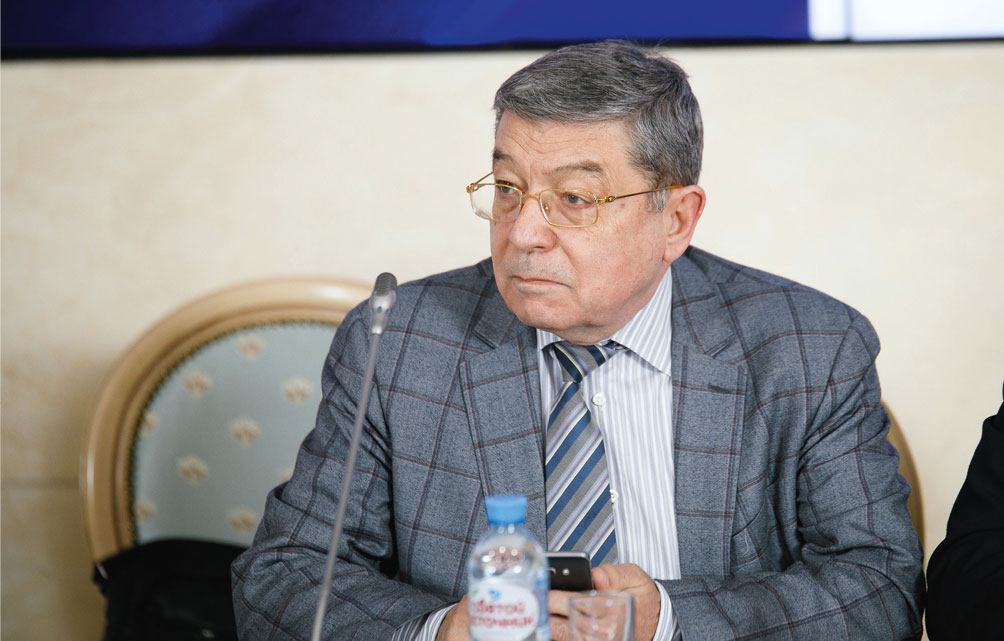
The Civic Chamber does not bypass the complex issues of social, legal and cultural adaptation and integration of migrants in Russia. Within the framework of conferences and round tables, as well as direct meetings with representatives of the migrant community, new forms and tools for the prevention of the ideas of pseudo-religious extremism and terrorism among labor migrants arriving from the CIS republics have been developed.
The working group on countering pseudo-religious extremism has developed a methodological manual for the regions within this context.
The ideological support of a terrorist orientation is actively being formed not only in open public space, but also in closed penitentiary institutions. In order to prevent extremism among those convicted, the Civic Chamber of the Russian Federation published the “Collection of legal acts and information materials on the prevention of pseudo-religious extremism and interaction with religious organizations in the institutions of penal system of the Russian Federation” for representatives of civic chambers, religious organizations, the Federal Penitentiary Service, and public observation commissions, and authorities of the constituent entities of the Russian Federation.
